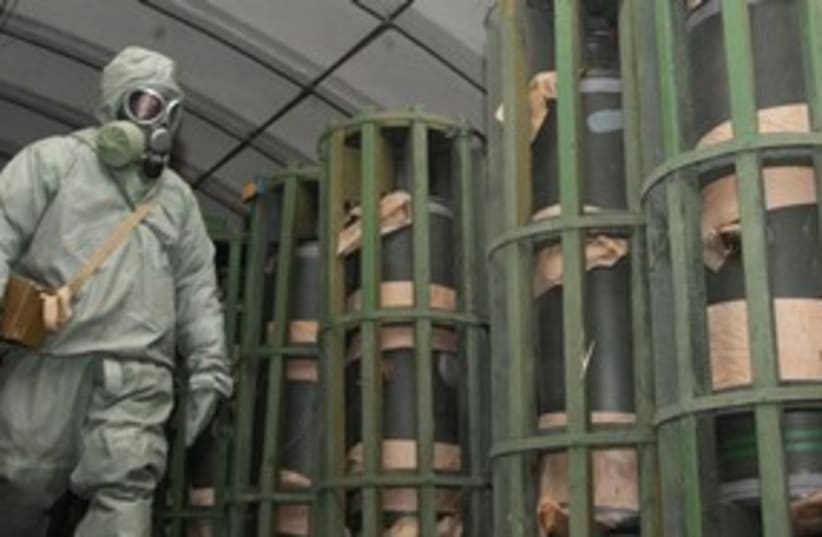Several countries express 'grave concern'Because it has not signed the chemical weapons ban treaty and the United Nations has not intervened, Syria is under no international obligation to declare its chemical weapons, give them up or allow inspectors to monitor them."There is a very odd silence in the corridors of the OPCW about Syria, even though several individual countries have expressed grave concerns," said an OPCW official."The silence doesn't mean there is a lack of concern. It is definitely the 800 pound gorilla in the room," he said. "Syria is the overriding source of concern for chemical weapons in the world right now."With the OPCW's hands tied, the only international forum to discuss Syria's chemical weapons would be the UN Security Council, where officials said the issue has not been raised.In late February, Uzumcu met UN Secretary General Ban Ki-moon. They "noted with concern the reports on the possible existence of chemical weapons," but took no further action.Uzumcu said his teams could deploy within 12 hours for an inspection were they given an order by the United Nations."That would obviously require some preparedness for some specific cases like Syria...but chemical weapons are chemical weapons, so this is well known to our experts," Uzumcu said.Syria has joined the 1925 Geneva Protocol, which prohibits first use of chemical or biological weapons, but does not mention production, storage or transfer of them.The OPCW, the Hague-based organization founded to oversee a ban on the production, stockpiling and use of chemical weapons, has 188 member nations, but has struggled to bring on board countries in the Middle East, where poison gas has been used repeatedly since the 1960s.Egypt deployed phosgene and mustard gas against Yemeni royalist forces in the mid 1960s. It has not reported the destruction of chemical agents or weapons to the OPCW.Iraqi dictator Saddam Hussein killed thousands of Iranians and Iraqi Kurds in more than a dozen poison gas attacks during the Iran-Iraq war in the 1980s. In March 1988 Iraq dropped canisters of Tabun, Sarin, VX and mustard gas, killing 5,000 villagers in the Kurdish town of Halabja.US and British suspicion that Saddam still possessed chemical and biological weapons - despite being ordered by the Security Council to give them up - became the justification for the 2003 invasion to topple him.After the invasion no banned weapons were found, seriously damaging the credibility of Washington, London and their intelligence agencies.Libya, which developed a chemical weapons program under the late leader Muammar Gaddafi, is set to resume destroying tonnes of aging mustard gas later this year with the help of the OPCW.
Syria uprising creates chemical weapons concerns
World powers fear Assad could lose control of a secret stockpile of chemical weapons, giving terrorists access to deadly poison gas.

Several countries express 'grave concern'Because it has not signed the chemical weapons ban treaty and the United Nations has not intervened, Syria is under no international obligation to declare its chemical weapons, give them up or allow inspectors to monitor them."There is a very odd silence in the corridors of the OPCW about Syria, even though several individual countries have expressed grave concerns," said an OPCW official."The silence doesn't mean there is a lack of concern. It is definitely the 800 pound gorilla in the room," he said. "Syria is the overriding source of concern for chemical weapons in the world right now."With the OPCW's hands tied, the only international forum to discuss Syria's chemical weapons would be the UN Security Council, where officials said the issue has not been raised.In late February, Uzumcu met UN Secretary General Ban Ki-moon. They "noted with concern the reports on the possible existence of chemical weapons," but took no further action.Uzumcu said his teams could deploy within 12 hours for an inspection were they given an order by the United Nations."That would obviously require some preparedness for some specific cases like Syria...but chemical weapons are chemical weapons, so this is well known to our experts," Uzumcu said.Syria has joined the 1925 Geneva Protocol, which prohibits first use of chemical or biological weapons, but does not mention production, storage or transfer of them.The OPCW, the Hague-based organization founded to oversee a ban on the production, stockpiling and use of chemical weapons, has 188 member nations, but has struggled to bring on board countries in the Middle East, where poison gas has been used repeatedly since the 1960s.Egypt deployed phosgene and mustard gas against Yemeni royalist forces in the mid 1960s. It has not reported the destruction of chemical agents or weapons to the OPCW.Iraqi dictator Saddam Hussein killed thousands of Iranians and Iraqi Kurds in more than a dozen poison gas attacks during the Iran-Iraq war in the 1980s. In March 1988 Iraq dropped canisters of Tabun, Sarin, VX and mustard gas, killing 5,000 villagers in the Kurdish town of Halabja.US and British suspicion that Saddam still possessed chemical and biological weapons - despite being ordered by the Security Council to give them up - became the justification for the 2003 invasion to topple him.After the invasion no banned weapons were found, seriously damaging the credibility of Washington, London and their intelligence agencies.Libya, which developed a chemical weapons program under the late leader Muammar Gaddafi, is set to resume destroying tonnes of aging mustard gas later this year with the help of the OPCW.